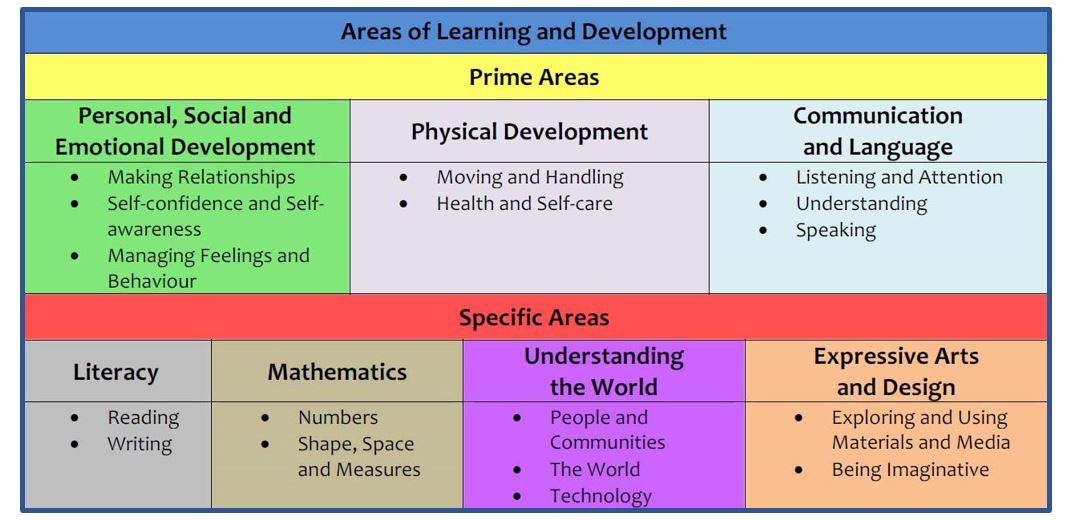Early Years Curriculum
Meet Our Reception Team
Miss White (Class Teacher)

Mrs Barden (Higher Level Teaching Assistant)

Miss Bunn (Head of School)

Useful Information
Am I ready for school- Tips for parents
Starting at Turnditch School BookletEarly Years Handbook
What is the Early Years Foundation Stage?
The Early Years Foundation Stage (EYFS) begins from birth for any children who attend a nursery, pre-school, or are cared for by a childminder. As they join our Early Years, they continue to be part of the EYFS until the end of the Reception year.
Our team are passionate about promoting a ‘Child Led’ approach to learning. We believe that children learn best through a balance of child-initiated play and adult led activities. We support our children in becoming self-motivated learners who embrace challenge and are inspired by the adventure of learning.
The Foundation Stage Curriculum
By the end of Reception children should have attained the ELG (Early Learning Goal) in all seven areas of learning. The seven areas of learning are split into the prime and specific areas to ensure that each child is exposed to a bespoke, broad and balanced curriculum.
The prime areas are fundamental and support learning in all other areas:
- Personal, Social and Emotional Development
- Communication and Language
- Physical Development
The specific areas include essential skills and knowledge and provide important contexts for learning:
- Literacy
- Mathematics
- Understanding the World
- Expressive Arts and Design

The curriculum content is presented in a way that is appropriate to how very young children learn. It includes adult-directed and child selected activities and is closely monitored to ensure that your child takes advantage of the broad curriculum that is offered to them. We aim to ensure that your child has access to a positive, motivating and secure environment in which to develop their skills.
https://help-for-early-years-providers.education.gov.uk/areas-of-learning
Curriculum Intent
At Turnditch, our Early Years Foundation Stage Curriculum is designed to promote and encourage all children to be confident, inquisitive and independent happy learners.
We aim to ensure that we provide all children with the best start to their education that enables them to fulfil their full potential and achieve future success regardless of their various starting points and backgrounds by creating a holistic and inclusive curriculum. We ensure that all children’s individual needs are met through careful planning and assessment, identifying and addressing any issues and implementing early intervention or additional support if required.
At Turnditch we recognise every child as a unique individual, and we acknowledge and promote children’s interests to provide them with the opportunities to follow their imagination and creativity. We celebrate the differences in our school community, and always strive to promote and instill a love for learning.
Curriculum Implementation
At Turnditch we believe all children learn best when they feel secure, safe and happy. Our teaching and practice is led by the four guiding principles.
The Principles are;
That every child is unique
- That every child can learn to be strong and independent through positive relationships
- That children learn and develop best in enabling environments
- That children develop and learn in different ways
The Characteristics of Effective Learning are threaded through, and central, to all learning in the EYFS curriculum. Emphasis is placed upon playing and learning, active learning and thinking critically.
Children are provided with plenty of time to engage in ‘exploration’ throughout the variety of experiences, which is carefully planned to engage and challenge them in the provision. The curriculum is planned for the inside and outside classrooms and is planned in a cross-curricular way to enable all aspects of the children’s development
Curriculum Impact
At Turnditch, we aim to ensure that all children across the EYFS achieve their full potential by providing a broad and balanced curriculum. Our creative and balanced provision of learning experiences enables our children to develop as happy, motivated, and independent learners. We strive to ensure each child makes a very good level of progress through to the Early Learning Goals at the end of Reception from their individual starting points. All children get the best possible start to their school life and develop the knowledge and skills needed to succeed as they continue their learning journey into Key Stag One.
To ensure that we are providing all children with a first class high quality early education, we use the Seven Key Features of Effective Practice.
Seven Key Features of Effective Practice
Learning Through Play
The Foundation Stage area provides stimulating, exciting and well-organised resources for your child to use and explore at their own pace. The resources are easily accessible and presented in areas, which are referred to as Continuous Provision areas.
The following Continuous Provision areas are provided:
- Role Play
- Water
- Reading Area
- Malleable/Creative
- Construction
- Writing
- Mathematics
- Small world
- Outdoor play
- Home corner/ Café
Play is an effective and valuable approach to learning and children put a great deal of effort into it. They often become absorbed and display high levels of concentration. Through their exploration, experimentation and discovery, various concepts are developed and formed. The curriculum is therefore planned and adapted to fit the needs, interests and learning styles of the children.
Characteristics of Effective Learning
In Reception a rich learning environment is provided where children are challenged to develop further and become independent learners. In order to achieve this we maximise the opportunities for the children to develop their characteristics of effective learning.
They are:
Playing and exploring
- Finding out and exploring
- Using what they know in their play
- Being willing to have a go
Active learning
- Being involved and concentrating
- Keeping on trying
- Enjoying achieving what they set out to do
Creating and thinking critically
- Having their own ideas
- Using what they already know to learn new things
- Choosing ways to do things and finding new ways
Mark Making & Handwriting
At Turnditch, we use the Little Wandle letter formation rhymes to ensure we are forming our letters correctly and starting at the correct starting point to write. We say the rhymes as we write the letters. If you would like to use the sheet to practise our writing rhymes at home, that would be great. We also begin to introduce the children to cursive (joined) handwriting during their time in reception which prepares them well for year 1 expectations.
Please see our handwriting information and policy here.
Phonics and reading
We follow Letters and Sounds through Little Wandle. This Programme is one of the DfE’s approved phonics teaching programmes. It follows the order of Letters and Sounds and aims to help all children learn to read by the age of six in a fun and accessible way.
In reception we foster a love of reading. We read class stories every day and very often read stories together on our class SmartBoard. Your child will begin to receive their own reading books during their first term in school. These books will be wordless initially and you should encourage your child to look at the illustrations and tell you a story. We will assess your child’s knowledge of phonics regularly and allocate books that are appropriate to their reading development.
Please see the phonics and letter formation rhymes we use in school here.
Number
We build on the foundations provided by parents so that children are receptive to the concepts of number without realising it. We point out things, which are the same and therefore go together (sorting), for example, a pair of socks or two red flowers and things that match such as a cup and saucer or knife and fork. These concepts must be understood before any formal number of work can be introduced. Counting is great fun for young children but they must grasp the idea of ‘one number for one item’.
Continuous provision and role play opportunities are linked closely to developing early skills in mathematics. Children enjoy exploring money and coin value by playing shops and talking about concepts such as more/less/few, empty/full, heavy/light etc in the water and sand areas.
Please see more information on our maths page here.
Please feel free to contact us directly if you have any questions. No question is too small.
headteacher@turnditch.derbyshire.sch.uk
enquiries@turnditch.derbyshire.sch.uk
You can also click this link to find out more about admissions to our school.
Apply for a school place...
If you would still like to apply for a place here at Turnditch CE Primary School for September 2025 please Click here – Derbyshire County Council






